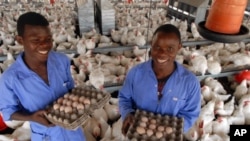Private businesses are being encouraged to assume a greater role in development efforts as part of the Obama administration's agricultural development initiative.
Food prices are at record highs, and experts are sounding alarms about the potential for civil unrest. The Obama administration has made improving developing world food security an important foreign policy goal.
But rather than relying solely on governments and civil society groups as in the past, the administration is highlighting the role the profit motive can play in economic development.
Mozambique's poultry boom
At a recent congressional briefing, the growth of Mozambique's poultry industry was cited as one example.
Until recently, domestic poultry farmers were unable to compete with imports.
Mozambican poultry farmer Derek Xavier says part of the reason was the way farmers raised their birds.
"We just used to have them at home," he says. "We had no medication, no vaccination. And obviously, with no good treatment, the chickens are always thin, and no good meat."
It did not help that foreign producers were using Mozambique as a market of last resort to dump nearly spoiled chicken.
Industry overhaul
That all started to change in 2005. An industry transformation began with help from the U.S. government, the business-focused development group TechnoServe, and the U.S. agribusiness giant, Cargill.
Mozambican farmers were organized. Vaccination, education, and disease monitoring programs were developed. Trade regulations were changed to prevent import dumping.
The overhaus brought about dramatic changes, according to Florencia Cipriano, chief veterinarian for the Mozambique government. She told the briefing that in 2005, domestic producers raised only a third of the broiler chickens sold.
"Today," she said, "Mozambique broilers outnumber imports three to one."
Feeding all those chickens has also spurred a roughly four-fold growth in the domestic feed grain industry, she says. Cipriano credits the chicken boom with creating about 90,000 jobs, and helping tens of thousands of small farmers improve their incomes.
Business meets development aid
"We want to work more with the private sector than we have in the past," said Gregory Gottlieb, head of the food security bureau at the U.S. Agency for International Development. "This time around, I think we want to look more at economic growth. Real economic growth."
Gottlieb told the briefing that real economic growth comes from focusing on the profit motive for everyone from farmers and their suppliers to retailers who sell their products, and the partnership with Cargill and TechnoServe is a good example.
Profit is the reason Cargill gets involved in development, says the company's director of international business relations, Devry Boughner.
"That's not a bad thing in our mind," she says. "Because as we make profits in these countries and invest overseas, we're able to re-invest and re-partner and re-up our commitment to global food security."
Aid budget cuts loom
But the Obama administration's commitment to global food security faces a challenge as lawmakers consider the next federal budget. The administration dramatically increased funding for agricultural development with a three-point-five billion dollar initiative known as "Feed the Future."
But with U.S. unemployment at 9 percent and a $14 trillion national debt, Republicans took over the House of Representatives this fall pledging to cut federal spending.
"Moral arguments aside, we must stop sending hundreds of billions of dollars to foreign governments when our own economy is in shambles," says Texas Congressman Ron Paul.
Paul is widely considered to be outside the political mainstream on most issues. But a recent Gallup poll found nearly 60 percent of Americans favor cutting foreign aid.
Business case for aid
At the congressional briefing, Cargill's Devry Boughner made the business case that aid is in the company's and the country's long-term interest. Look at South Korea, she said. It took time, but development aid turned that country into an economic powerhouse and a market for U.S. goods.
"We're now looking to take this relationship to stronger commercial ties, which will translate to stronger economic growth here in the United States," she added.
A big free trade agreement with South Korea is currently before the Senate that backers say will create jobs in the U.S. In the long run, Boughner says, when private businesses can help transform industries, as Cargill helped to do in Mozambique, aid can become trade and provide a valuable return on investments.




